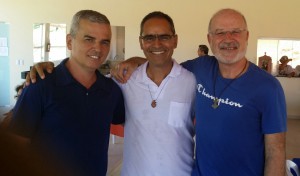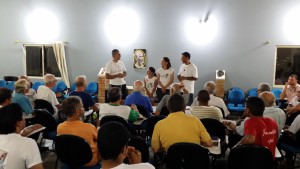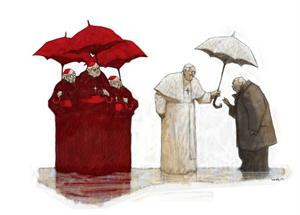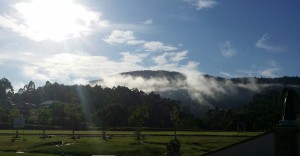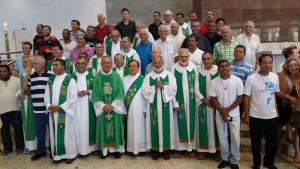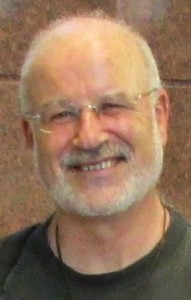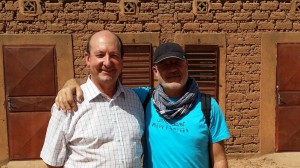 What a joy it was for me to find myself in the Monastery of Jésus Sauveur de Honda in Burkina Faso with Jean Michel! He was there for a month helping the monks in their theological formation. We, the Spanish workers in the WEND BE NE DO project, María, Carlos and I, of our Tienda Asilo de San Pedro Foundation, stopped off before reaching the project at Bam to greet the brothers in the monastery. We shared their table and prayer. We invited Jean Michel and the community to take part on Sunday, 1st February, in the celebration for the children of the project, with the blessing of the new Multipurpose Centre. It was a surprise that filled us with joy to meet this brother of ours in deepest Africa.
What a joy it was for me to find myself in the Monastery of Jésus Sauveur de Honda in Burkina Faso with Jean Michel! He was there for a month helping the monks in their theological formation. We, the Spanish workers in the WEND BE NE DO project, María, Carlos and I, of our Tienda Asilo de San Pedro Foundation, stopped off before reaching the project at Bam to greet the brothers in the monastery. We shared their table and prayer. We invited Jean Michel and the community to take part on Sunday, 1st February, in the celebration for the children of the project, with the blessing of the new Multipurpose Centre. It was a surprise that filled us with joy to meet this brother of ours in deepest Africa.
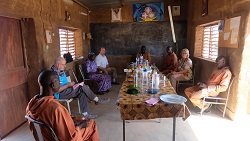 The Monastery of Jésus Sauveur, founded by Fr. ‘Little Brother’ Emmanuel KALMOGO, now deceased, follows the spirituality of St. Bernard and of Charles de FOUCAULD, and is open to casual visitors, with places for silence and prayer. The simple and humble lifestyle incarnate in the reality of Burkina Faso of these few men following Jesus is its most welcoming feature. Jean Michel helped them in their formation and shared in the daily work, as the monastery is self-sufficient for its upkeep and farms the fields that surround the simple houses that make up the monastic settlement.
The Monastery of Jésus Sauveur, founded by Fr. ‘Little Brother’ Emmanuel KALMOGO, now deceased, follows the spirituality of St. Bernard and of Charles de FOUCAULD, and is open to casual visitors, with places for silence and prayer. The simple and humble lifestyle incarnate in the reality of Burkina Faso of these few men following Jesus is its most welcoming feature. Jean Michel helped them in their formation and shared in the daily work, as the monastery is self-sufficient for its upkeep and farms the fields that surround the simple houses that make up the monastic settlement.
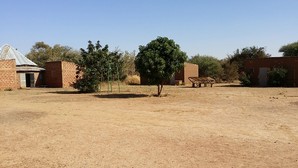 We began on February 1st with a reception for the almost two hundred children, adolescents and youths the project attends to, some for the past ten years, when we started, in a spirit of brotherhood, with the motto “BE WITH”, establishing Nazareth, from day to day with those affected by HIV in conditions of extreme poverty. Our surprise was to see the Project’s vehicle arrive with a monk and Jean Michel, as the volunteer driver had set off early for Honda to pick them up, on the initiative of Suzanne, the Coordinator of WEND BE NE DO in Burkina.
We began on February 1st with a reception for the almost two hundred children, adolescents and youths the project attends to, some for the past ten years, when we started, in a spirit of brotherhood, with the motto “BE WITH”, establishing Nazareth, from day to day with those affected by HIV in conditions of extreme poverty. Our surprise was to see the Project’s vehicle arrive with a monk and Jean Michel, as the volunteer driver had set off early for Honda to pick them up, on the initiative of Suzanne, the Coordinator of WEND BE NE DO in Burkina.
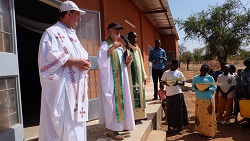 It was a great joy to share in the celebration of the Eucharist with Jacques, a priest who works in the laboratory of the diocesan medical centre of Bam, with Jean Michel and the adults and children of the project, with songs, dance and an air of festivity and, at the same time, one of respect. Muslims and Christians rejoicing in the one God.
It was a great joy to share in the celebration of the Eucharist with Jacques, a priest who works in the laboratory of the diocesan medical centre of Bam, with Jean Michel and the adults and children of the project, with songs, dance and an air of festivity and, at the same time, one of respect. Muslims and Christians rejoicing in the one God.
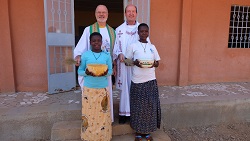 At the end of the Sunday Eucharist, we got ready to bless the new Multi-purpose Centre of the Project, built by the Foundation, which makes it possible for activities to take place with improved spaces and facilities for more than six hundred people of all ages, affected by the stigma of HIV, malnutrition, social abandonment, and lack of education, in the case of the children, many of whom are orphans or children at risk. Jean Michel and I, with two good helpers, beneficiaries of WEND BE NE DO, blessed the water
At the end of the Sunday Eucharist, we got ready to bless the new Multi-purpose Centre of the Project, built by the Foundation, which makes it possible for activities to take place with improved spaces and facilities for more than six hundred people of all ages, affected by the stigma of HIV, malnutrition, social abandonment, and lack of education, in the case of the children, many of whom are orphans or children at risk. Jean Michel and I, with two good helpers, beneficiaries of WEND BE NE DO, blessed the water 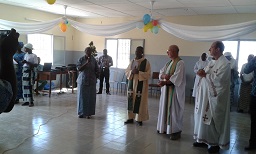 together and shared the blessing of the rooms, Jean Michel taking the west wing and I the east. It reminded me of the Easter Vigil in my parish, where we all finish up soaked with the water of life, with joy and hope. It was an Easter celebration in Ordinary Time!
together and shared the blessing of the rooms, Jean Michel taking the west wing and I the east. It reminded me of the Easter Vigil in my parish, where we all finish up soaked with the water of life, with joy and hope. It was an Easter celebration in Ordinary Time!
Afterwards we both gave the final blessing in one of the rooms of the Multipurpose centre together with Jacques, and this gave way to the party, where we all behaved like children and took part in the games, dances, the peace-tree activity, prepared by the 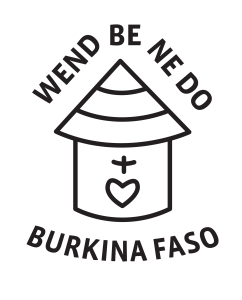 older ones who as the first children ten years earlier began a crucial stage of their lives in WEND BE NE DO, and today, for the most part, have recovered their health and dignity, have overcome malnutrition, and have the chance to continue studies – one of them will begin studying social and psychological care support in university next term.
older ones who as the first children ten years earlier began a crucial stage of their lives in WEND BE NE DO, and today, for the most part, have recovered their health and dignity, have overcome malnutrition, and have the chance to continue studies – one of them will begin studying social and psychological care support in university next term.
We shared a festive lunch and in the afternoon we left surrounded by voices, and by tamtam improvised from large cans, saying goodbye also to youngsters who had come from their villages, up to 30km distant from the Project; some remained in the Centre, to spend the night and return home the next day.
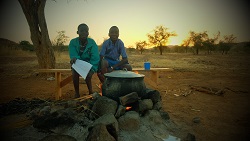 For me meeting with Jean Michel in one of my favourite places in the world has been an experience of brotherhood and a great gift. I felt the support of a brother from the Fraternity who shares the dream and the struggle for those who need better opportunities to improve their lives. Thanks, Jean Michel, for “being with” us, for sharing Jesus and enjoying friendship with the very least. Your experience of Africa in earlier years has been your best credential and passport; neither of us is a stranger in Burkina Faso. I remember that when we prayed the Prayer of Abandonment in Honda, with the monks and my Spanish friends, at the conclusion of the hour of Nones, I felt the universality of the message of Brother Charles and the absence of borders in the fraternity.
For me meeting with Jean Michel in one of my favourite places in the world has been an experience of brotherhood and a great gift. I felt the support of a brother from the Fraternity who shares the dream and the struggle for those who need better opportunities to improve their lives. Thanks, Jean Michel, for “being with” us, for sharing Jesus and enjoying friendship with the very least. Your experience of Africa in earlier years has been your best credential and passport; neither of us is a stranger in Burkina Faso. I remember that when we prayed the Prayer of Abandonment in Honda, with the monks and my Spanish friends, at the conclusion of the hour of Nones, I felt the universality of the message of Brother Charles and the absence of borders in the fraternity.
Aurelio SANZ BAEZA
Perín, Cartagena, Murcia, Spain, 11 February 2015




